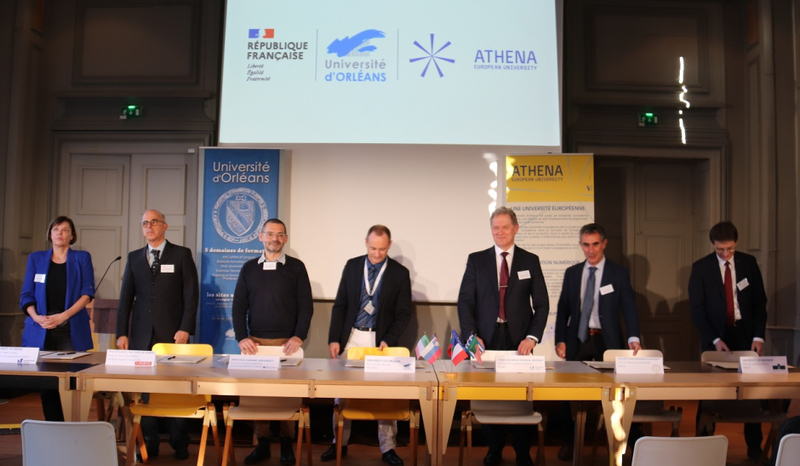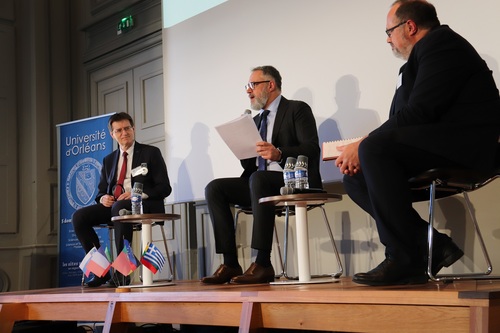- Programmes in English 2025/2026
- Admission 2024/2025 Scholarships
- For exchange students
- Free Movers
- Transfer studies
- Erasmus+ studies and traineeships
- Mentor programme
- Student testimonials
- Accommodation
- Career Services
- Medical Care
- Immigration Regulations
- Leisure and Student Activities
- Useful information
- VILNIUS TECH for Creators of Tomorrow
- Mental and spiritual support
- Representatives Abroad
- Contacts
- Computer Engineering

2022-03-03
ATHENA Alliance Meeting: Consortium Agreement signed
As part of the French Presidency of the European Union, the University of Orléans and its European alliance ATHENA are organizing a round table discussion about the future of "European Universities" on February 28 at the International University Centre for Research, Hôtel Dupanloup in Orléans.
Vanessa Debiais-Sainton, Head of the Unit for Higher Education Policy and Programs in the European Commission's Directorate-General for Education, Youth and Culture, Anne-Sophie Barthez, Director-General for Higher Education, President of the French-German University, Philippe Gréciano, Peter Haring Bolívar, Chair of the EUA Innovation Ecosystem Expert Group, Zdravko Kačič, Rector of the University of Maribor, Teresa Restivo, Member of the Board of the Portuguese Agency for the Evaluation and Accreditation of Higher Education Programs contributed to the discussion.
Rector of Vilnius Gediminas Technical University (VILNIUS TECH) Romualdas Kliukas spoke at the event about the role of universities in achieving peace and the position on Russia's war against Ukraine.
The European Universities initiative is a flagship project of the European Union in the field of higher education and research, aiming to make Europe's universities more open internationally, more competitive and also more inclusive. These European Universities are alliances federating between 5 and 8 institutions. Similar to transnational laboratories, they aim to invent and test new models of cooperation in the European higher education area, laying the groundwork for the universities of the future. The expectations are high: within 3 years, the first alliances are called upon to leverage significant institutional transformation students, staff and stakeholders such as the local and regional ecosystems in the process.
ATHENA European University
ATHENA is one of the European University pilot projects selected by the European Commission in 2020, bringing together the Universities of Orléans, Siegen (Germany), Maribor (Slovenia), the Polytechnic Institute of Porto (Portugal, coordinator), Vilnius Tech (Lithuania), the University of Niccolò Cusano (Italy) and the Hellenic Mediterranean University (Greece).
Focusing on the digital transformation of societies, the European University ATHENA aims to create internationalized programs, give access to international mobility to the largest number of students, including those with disabilities, promote the emergence of joint research and development projects and open up new European perspectives not only to the more than 120,000 students and 10,000 staff of the alliance but also to local communities and partners.
During the meeting, the rectors of the universities of the ATHENA Alliance signed a consortium agreement, which confirmed the partners' intention to jointly pursue the ambitious goals of the European University Initiative.
Benefits of ATHENA for Lithuanian Universities
Alliances are expected to have an impact on national systems: the regulation of studies, the development of new forms of study. VILNIUS TECH is very important to participate in these changes, to be a leading force, to initiate changes. In Lithuania, as many as five universities are participants in the European University Initiative, which is a fantastic result for the country. Lithuanian universities, which belong to the alliances of ATHENA, ARQUS, ECIU, EU Conexus, Transform4Europe, are already working together: coordinating many joint actions, jointly preparing proposals for changes in the legal framework, submitting proposals for the validation of interdisciplinary studies, microcredit, joint study programs and joint degrees, especially joint doctoral programs - there are many areas in which the forces of Lithuanian universities are united and solutions are offered. This is a field of breakthrough and experimentation that is of great interest to the university. VILNIUS TECH always strives to be among the first to create and test change.
"At the national level, it is very important for us to have the flexibility needed to combine content created by different partners and very different forms of learning. I am talking about joint study programs, double degrees, more flexible recognition of study results obtained in other institutions. ATHENA operates in all the main areas of the university's activities: studies, science and cooperation with society and business. The latter activity is also directly related to the development of social and technological innovations. Thus, all these directions are important for VILNIUS TECH ", - doc. dr. Asta Radzevičienė.
She also emphasizes that three years after the end of the first, pilot phase, the ATHENA Alliance will continue to operate with important unifying activities and a sustainable financial framework. Two more new partners are expected to join the Alliance, complementing ATHENA's expertise. Expansion can be expected through the newly launched projects of Horizon, ERASMUS + and other programs - alliance partners are currently working together and submitting project applications. These initiatives and ideas should make ATHENA sustainable.
More information regarding ATHENA:
https://athena.um.si/seminar/
http://www.athena-uni.eu/
https://twitter.com/athena_europe/
https://www.facebook.com/athena.university/
Vanessa Debiais-Sainton, Head of the Unit for Higher Education Policy and Programs in the European Commission's Directorate-General for Education, Youth and Culture, Anne-Sophie Barthez, Director-General for Higher Education, President of the French-German University, Philippe Gréciano, Peter Haring Bolívar, Chair of the EUA Innovation Ecosystem Expert Group, Zdravko Kačič, Rector of the University of Maribor, Teresa Restivo, Member of the Board of the Portuguese Agency for the Evaluation and Accreditation of Higher Education Programs contributed to the discussion.
Rector of Vilnius Gediminas Technical University (VILNIUS TECH) Romualdas Kliukas spoke at the event about the role of universities in achieving peace and the position on Russia's war against Ukraine.
The European Universities initiative is a flagship project of the European Union in the field of higher education and research, aiming to make Europe's universities more open internationally, more competitive and also more inclusive. These European Universities are alliances federating between 5 and 8 institutions. Similar to transnational laboratories, they aim to invent and test new models of cooperation in the European higher education area, laying the groundwork for the universities of the future. The expectations are high: within 3 years, the first alliances are called upon to leverage significant institutional transformation students, staff and stakeholders such as the local and regional ecosystems in the process.
ATHENA European University
ATHENA is one of the European University pilot projects selected by the European Commission in 2020, bringing together the Universities of Orléans, Siegen (Germany), Maribor (Slovenia), the Polytechnic Institute of Porto (Portugal, coordinator), Vilnius Tech (Lithuania), the University of Niccolò Cusano (Italy) and the Hellenic Mediterranean University (Greece).
Focusing on the digital transformation of societies, the European University ATHENA aims to create internationalized programs, give access to international mobility to the largest number of students, including those with disabilities, promote the emergence of joint research and development projects and open up new European perspectives not only to the more than 120,000 students and 10,000 staff of the alliance but also to local communities and partners.
During the meeting, the rectors of the universities of the ATHENA Alliance signed a consortium agreement, which confirmed the partners' intention to jointly pursue the ambitious goals of the European University Initiative.
Benefits of ATHENA for Lithuanian Universities
Alliances are expected to have an impact on national systems: the regulation of studies, the development of new forms of study. VILNIUS TECH is very important to participate in these changes, to be a leading force, to initiate changes. In Lithuania, as many as five universities are participants in the European University Initiative, which is a fantastic result for the country. Lithuanian universities, which belong to the alliances of ATHENA, ARQUS, ECIU, EU Conexus, Transform4Europe, are already working together: coordinating many joint actions, jointly preparing proposals for changes in the legal framework, submitting proposals for the validation of interdisciplinary studies, microcredit, joint study programs and joint degrees, especially joint doctoral programs - there are many areas in which the forces of Lithuanian universities are united and solutions are offered. This is a field of breakthrough and experimentation that is of great interest to the university. VILNIUS TECH always strives to be among the first to create and test change.
"At the national level, it is very important for us to have the flexibility needed to combine content created by different partners and very different forms of learning. I am talking about joint study programs, double degrees, more flexible recognition of study results obtained in other institutions. ATHENA operates in all the main areas of the university's activities: studies, science and cooperation with society and business. The latter activity is also directly related to the development of social and technological innovations. Thus, all these directions are important for VILNIUS TECH ", - doc. dr. Asta Radzevičienė.
She also emphasizes that three years after the end of the first, pilot phase, the ATHENA Alliance will continue to operate with important unifying activities and a sustainable financial framework. Two more new partners are expected to join the Alliance, complementing ATHENA's expertise. Expansion can be expected through the newly launched projects of Horizon, ERASMUS + and other programs - alliance partners are currently working together and submitting project applications. These initiatives and ideas should make ATHENA sustainable.
More information regarding ATHENA:
https://athena.um.si/seminar/
http://www.athena-uni.eu/
https://twitter.com/athena_europe/
https://www.facebook.com/athena.university/


























